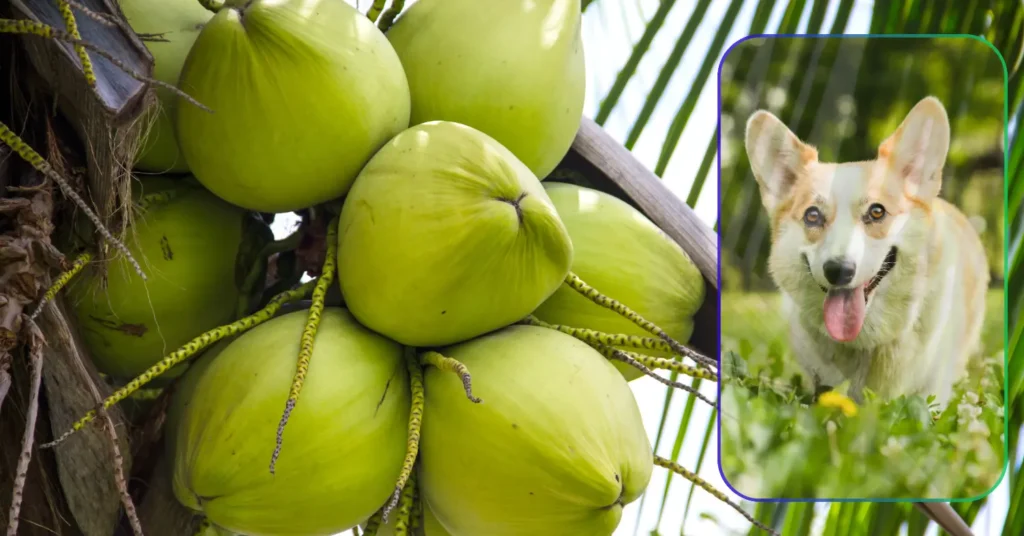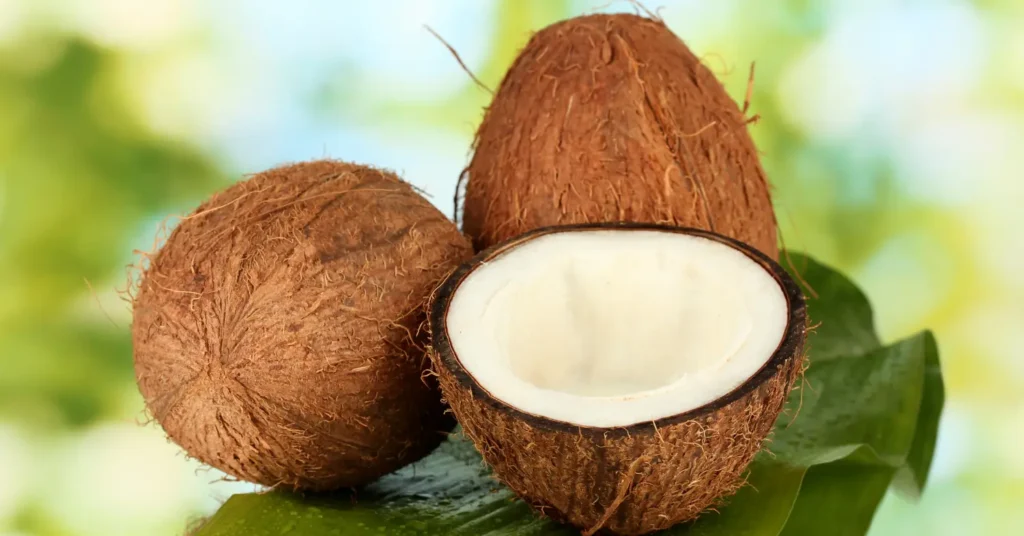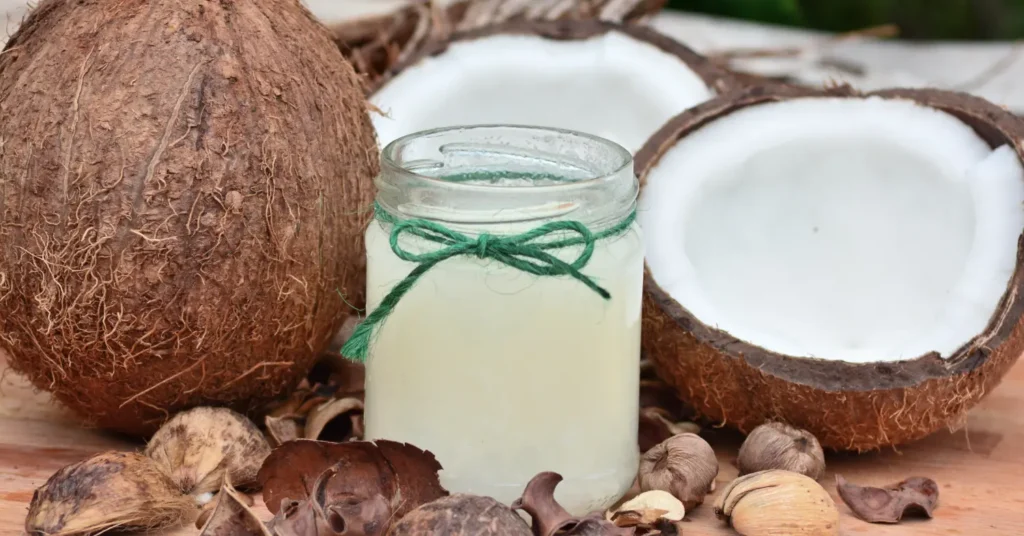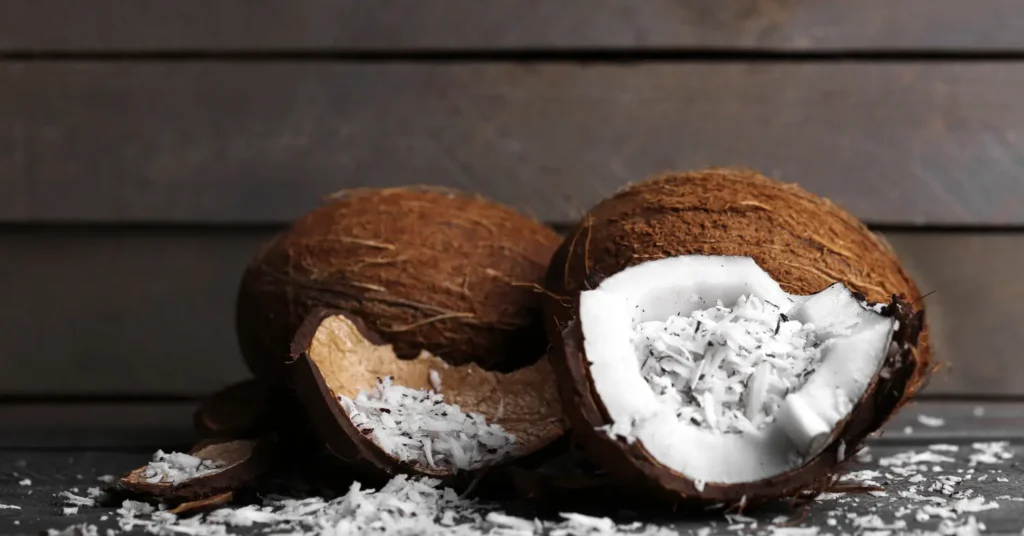Can dogs eat coconut? Coconut is a delicious and beneficial component of human diets, and it can be beneficial to dogs in tiny quantities. Coconut fruit (often referred to as “meat”) is high in vitamins, minerals, and essential fatty acids. As long as coconut is consumed with care, it’s a wonderful addition to your dog’s diet whether raw, dehydrated, blended into milk, or pressed into oil.
Another Interesting Read: Can Dogs Eat Raw Eggs? What You Need To Know
Coconut has become a popular choice among health enthusiasts, and dog owners, in turn, are considering sharing this tropical delight with their furry friends. The big question: Is it safe for dogs to indulge in coconut, and are there tangible benefits to incorporating it into their diet?
Coconuts, including their meat and oil, are safe and even beneficial for dogs when given in moderation. The antioxidants present in coconuts can contribute to enhancing a dog’s immune system.
Can Dogs Eat Coconut?

Coconut is a popular food ingredient, especially in tropical countries. It’s used in many different dishes and can also be eaten on its own. But can dogs eat coconut?
The answer is yes, dogs can eat coconut. Coconut is safe for dogs to eat in small amounts as a treat. However, it’s important to note that coconut contains a lot of fat and should not be given to dogs in large quantities. Too much fat can lead to obesity and other health problems in dogs.
Coconut is a good source of fiber and vitamins, and it can help improve your dog’s digestion. Coconut oil is also known for its anti-inflammatory properties and can be helpful in treating skin conditions like allergies and hot spots.
It comes packed with essential vitamins, nutrients, healthy fats, and carbohydrates, providing a wholesome boost to your dog’s energy levels and immune system. However, it’s essential to be mindful of medium-chain triglycerides present in coconut, which, while beneficial, can sometimes lead to digestive issues or bloating.
Start with small amounts and observe your dog’s response to prevent stomach upset.
Can Dogs Eat Coconut Oil?

Coconut oil contains a significant amount of saturated fats, predominantly medium-chain triglycerides (MCTs). MCTs, deemed “good” fats, are found not only in coconut oil but also in various human consumables like palmer kernel oil, butter, yogurt, milk, and cheese.
While lauric acid and other MCTs present in coconut oil showcase certain benefits, it falls short of meeting dogs’ daily fat requirements. The omega-6 and omega-3 acids in MCTs are insufficient, and their processing efficiency raises questions. Claims of safeguarding against bacteria, viruses, and fungi, although supported in lab tests, lack clear evidence of substantial protection for dogs.
Coconut oil can serve as a soothing balm for irritated areas, addressing hot spots and restoring moisture to dry, itchy skin. For a glossy coat, shampoos with coconut oil prove beneficial, while DIY paw balms can remedy cracked paws.
Although adverse effects are rare, consider these factors:
Feeding coconut oil to your dog, if approved, should be approached cautiously. Long-term use could lead to obesity and potentially trigger pancreatitis. Experimenting with small amounts and monitoring for adverse reactions is prudent.
Nutritional Value Of Coconut

Coconut is a nutritious fruit that provides many health benefits. It is a good source of fiber, vitamins, and minerals. The flesh of the coconut is high in saturated fat, but this is mostly composed of medium-chain fatty acids, which are not as detrimental to health as other types of saturated fat.
Coconut oil has been shown to have numerous health benefits, including reducing cholesterol levels and promoting weight loss. Coconut is also a good source of antioxidants and can help boost the immune system.
| Nutrient | Coconut Meat (1 oz) | Coconut Milk (1 cup) | Coconut Water (8 fl oz) | Coconut Oil (1 tbsp) |
|---|---|---|---|---|
| Calories | 187 | 45 | 46 | 104 |
| Fat (g) | 18 | 4 | 0.5 | 12 |
| Saturated Fat (g) | 16.2 | 3.5 | 0.4 | 9.6 |
| Protein (g) | 2 | 0 | 2 | 0 |
| Carbohydrates (g) | 7 | 2 | 9 | 0 |
| Fiber (g) | 4.6 (excellent source) | 1 | 2.6 | 0 |
| Sugar (g) | 2.1 | 0 | 6.3 | 0 |
Nutrition facts may vary by brand, but these values offer a general overview of coconut, showcasing its diverse nutritional content in various forms.
Overall, coconut is a nutritious fruit that can provide many health benefits. Including it as part of a healthy diet may help to improve overall health and well-being.
Benefits Of Coconut To Feed Dogs

Coconut is a nutritious food source that can be beneficial for dogs. Coconut oil can help improve your dog’s coat and skin, and it can also aid in digestion. Coconut meat is rich in fiber and can help regulate your dog’s blood sugar levels. Coconut water is also a good source of electrolytes and can help keep your dog hydrated. Talk to your veterinarian about whether feeding coconut to your dog is right for him or her.
Decreases Inflammation
Coconut meat is rich in lauric acid, a mid-chain fatty acid facilitating complete absorption and serving as an immediate energy source. This acid plays a vital role in combating viruses, offering anti-inflammatory properties. As inflammation is a leading cause of arthritis in dogs, including coconut treats in their diet can significantly contribute to their overall health.
Boosts Immune System
Loaded with antioxidants, coconut supports your dog’s immune system, aiding in a robust defense against harmful viruses and parasites. While not a cure for diseases, coconut’s anti-viral properties have garnered positive reviews.
Promotes Healthy Skin
Coconut, internally and externally applied, serves as a defense against fungi and parasites causing skin irritations. Coconut oil safeguards the skin from external threats, while coconut meat consumed in moderation aids in holistic skin health.
Fights Fungi and Bacteria
In humid climates, dogs are susceptible to fungi and bacteria. The antioxidants in coconut act as a shield, helping ward off these unwanted invaders. Whether in the form of treats or oils, coconut serves as an immunity booster against microbial threats.
Shiny Coat
Regular consumption of coconut treats contributes to a lustrous coat. The proteins in coconut nourish and strengthen the coat, leaving your dog with a gleaming appearance. Coconut treats and oils act as natural breath fresheners. The texture of coconut helps scrub away bacteria causing bad breath, ensuring your dog’s breath remains pleasant.
Risks Of Coconut To Feed Dogs

Coconut is not a nut, but rather a fruit. It is safe for dogs to consume in small quantities, but there are some risks to be aware of. The biggest risk is the potential for choking. Coconut shells and husks can break into small pieces that dogs could easily choke on. Be sure to remove any coconut before giving it to your dog.
Coconut oil is also safe for dogs to consume, but should be given in moderation. Coconut oil can cause digestive upset in some dogs, so start with a small amount and increase gradually.
As with any new food, it’s always best to check with your veterinarian before feeding coconut to your dog. Some dogs may be allergic to coconut, so it’s best to err on the side of caution.
How To Feed Coconut Safely To Dogs

If you’re looking for a nutritious treat for your dog, you may be considering feeding them coconut. But before you do, there are a few things you should know about how to feed coconut safely to dogs.
Feeding your dog coconut requires attention to certain guidelines to ensure their safety:
Be vigilant for signs of stomach discomfort or bloating, such as headaches, fatigue, diarrhea, or greasy stools. If observed, consult your veterinarian to rule out underlying issues.
1. Choose the Right Type of Coconut
There are two main types of coconut – fresh and dried. Fresh coconut is the best option for dogs, as it is lower in fat and sodium than dried coconut. It’s also a good source of fiber, vitamins, and minerals.
2. Avoid Coconut Milk
Coconut milk is high in fat and shouldn’t be fed to dogs. If you want to give your dog a taste of coconut, stick to the flesh of the fruit.
3. Feed in Moderation
Like with all treats, it’s important to feed coconut to your dog in moderation. Too much coconut can cause gastrointestinal upset, so start with a small amount and see how your dog reacts.
4. Choose Organic When Possible
When feeding coconut to your dog, choose organic when possible. This will help to ensure that the coconut you’re feeding is free of pesticides and other harmful chemicals.
5. Add to Their Regular Diet
If you want to feed your dog coconut on a regular basis, add it to their regular diet. This can be done by shredding the flesh of the fruit and adding it to their food bowl. You can also give them coconut oil as a supplement.
When feeding coconut to your dog, it’s important to choose the right type of coconut, avoid coconut milk, and feed in moderation. You should also try to choose organic when possible and add it to your regular diet. By following these tips, you can help to ensure that your dog enjoys the health benefits of coconut without any adverse effects.
Can Dogs Drink Coconut Water?

When it comes to hydrating your dog, water is essential, but coconut water can be a tasty option. Packed with electrolytes, it helps keep your furry friend hydrated and provides a nutrient boost with potassium, calcium, and vitamin C.
Be cautious, though—excessive consumption might upset your dog’s stomach or lead to too much pee. Remember, coconut water shouldn’t replace plain water in your dog’s hydration routine. Check for harmful sweeteners like xylitol in the coconut water.
Coconut water, in moderation, offers health perks for dogs:
Dogs can enjoy both coconut water and coconut milk in moderation. Coconut water is the clear liquid from young coconuts, while coconut milk is a fat-rich substitute made from water and grated coconut. Opt for organic, unsweetened coconut milk in small amounts.
Can Dogs Eat Coconut-flavored Food?

Coconut-flavored food is often safe for dogs to eat, but there are a few things to keep in mind.
First, many coconut-flavored foods contain sugar, which can be harmful to dogs in large quantities.
Secondly, some dogs may be allergic to coconut products. If your dog has never eaten coconut before, it’s best to start with a small amount to see if there are any adverse reactions.
Lastly, be sure to check the ingredients list of any coconut-flavored food to make sure it does not contain any harmful chemicals or additives.
Conclusion | Can Dogs Eat Coconut?
So, can dogs eat coconut? The answer is yes! Dogs can eat all parts of the coconut, including the meat, husk, and water. Coconut provides a number of health benefits for dogs, such as improving their coat condition, aiding in weight loss, and helping to fight infection. However, it’s important to make sure that your dog is not allergic to coconut before feeding it to them.
Coconut butter boasts MCTs, a type of healthy fat that provides easily digestible energy, making it a great option for active dogs. Too much coconut can cause gastrointestinal upset. When feeding coconut to your dog, make sure to choose organic when possible and add it to their regular diet.
By following these tips, you can help ensure that your dog enjoys the health benefits of coconut without any adverse effects. Thanks for Reading!
You Might Also Like:
Can Dogs Eat Cauliflower? Here’s Everything You Need To Know




